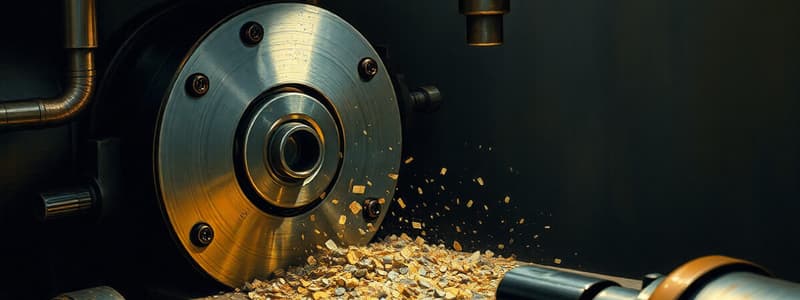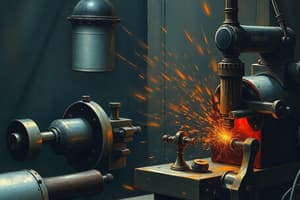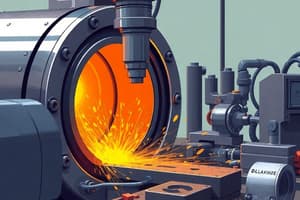Podcast
Questions and Answers
What is the primary purpose of EMMS?
What is the primary purpose of EMMS?
Which type of cutting tool is characterized by a single effective cutting edge?
Which type of cutting tool is characterized by a single effective cutting edge?
What type of chips are formed during the chip removal process?
What type of chips are formed during the chip removal process?
What is the main function of a lathe in turning?
What is the main function of a lathe in turning?
Signup and view all the answers
Which of the following tools is an example of a multipoint cutting tool?
Which of the following tools is an example of a multipoint cutting tool?
Signup and view all the answers
During the milling process, what action is performed by the milling cutter?
During the milling process, what action is performed by the milling cutter?
Signup and view all the answers
What is the role of the spindle in milling?
What is the role of the spindle in milling?
Signup and view all the answers
What type of lathe is specifically mentioned for preparing cope and drag mould?
What type of lathe is specifically mentioned for preparing cope and drag mould?
Signup and view all the answers
Which of the following best describes the cutting action of a single point cutting tool?
Which of the following best describes the cutting action of a single point cutting tool?
Signup and view all the answers
What happens to the material of the work piece during the chip removal process?
What happens to the material of the work piece during the chip removal process?
Signup and view all the answers
Study Notes
EMMS
- EMMS stands for Electrical Mechanical Machine Shop
- This shop prepares specimens for testing
- It also creates machining tools and cross-sections of wheels
- Operations include grinding, turning, milling, and finishing
Tools
-
Single Point Cutting Tool: Simplest type, with one cutting edge to remove excess material from a workpiece.
- Examples include lathe tools (chamfering, parting, facing), shaper tools, planer tools, and boring tools.
-
Multipoint Cutting Tool: Has multiple cutting edges.
- Examples include milling cutters, drill bits, reamers, broachers, and grinding wheels.
Chip Removal Process
- When a cutting tool moves against a workpiece, compressive force stresses the material.
- Material deforms plastically and shears off, creating small chips.
- Three types of chips:
- Continuous
- Continuous with built-up edge
- Discontinuous
Turning (Lathe)
- Turning is a machining process for making cylindrical and conical surfaces on rotating workpieces.
- A single-point cutting tool travels across the workpiece.
- Usually performed on a lathe.
- A turret lathe is used for preparing cope and drag molds.
Milling
- Milling removes excess material from a workpiece using a rotating multi-point cutting tool (milling cutter).
- The cutter rotates while the workpiece is fed against it.
- This process produces flat, angled, or curved surfaces.
- Useful for cutting threads, gears, keyways, slots, and other complex shapes.
Grinding
- Grinding removes excess material using an abrasive wheel (grinding wheel).
- The wheel is rotated at high speed and brought into contact with the workpiece.
- This process generates fine chips and is considered a finishing process.
- Grinding provides high accuracy and a smooth surface finish.
Studying That Suits You
Use AI to generate personalized quizzes and flashcards to suit your learning preferences.
Related Documents
Description
Explore the fundamentals of the Electrical Mechanical Machine Shop (EMMS), including essential machining processes like grinding, turning, and milling. This quiz covers tools used in machining, chip removal processes, and the types of cutting tools utilized in the shop. Test your knowledge on the various techniques and tools essential for effective machining.




